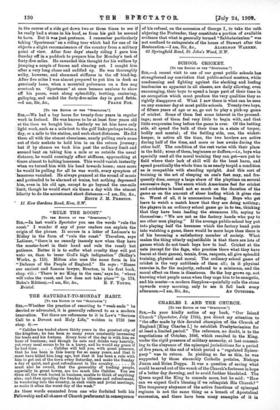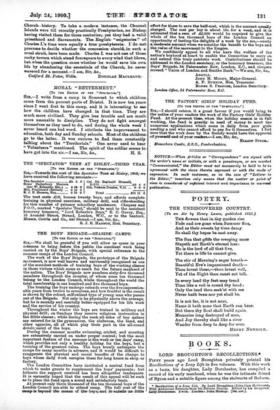CHARLES I. AND THE CHURCH.
[TO THE EDITOR 01 THE "SPECTATOR.']
SIR,—In your kindly notice of my book, "Our Island Church" (Spectator, July 17th), you direct my attention to "the offer made by this devoted champion of the Church of England [King Charles L] to establish Presbyterianism for at least a limited period." The reference, no doubt, is to the negotiations of October, 1646, which resulted in the King, under the rigid pressure of military necessity, at last consent- ing to the abeyance of the episcopal jurisdictions for a period of five years, at the end of which period a "regulated Episco- pacy" was to return. In yielding so far as this, he was supported by those staunchly Catholic prelates, Bishops Juxon and Brian Duppa. It was a question of saving what could be saved out of the wreck of the Church's fortunes in hope of a better day dawning, and to avoid further bloodshed. The Queen urged the King to concede more, but he said : "How can we expect God's blessing if we relinquish His Church?" The temporary abeyance of the active functions of episcopal regimen is not the same thing as a breach of Apostolical succession, and there have been many examples of it in Church .history: To. take a.. modern instance,. the Channel' Islands were till recently practically Presbyterian; no Bishop, having visited them for three centuries;. yet they had a valid, priesthood and Sacraments. The. English "seigniories " of Charles- L's time were equally a true .preebyterata. I" do nob presume, to decide whether the 'concession, should, in- such a cruel strait, have been made. Charles L was not one of those, rocky .towera which stand foursquare to every wind that blows,, bet when the question. came 'whether he would save: his own: life by abandoning the: essentials of the Church, he. never, wavered for a moment —I am; Sir,' dm.,



































 Previous page
Previous page